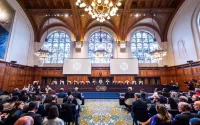29 March 2006Haaretz
There is logic behind the coincidence that involved the establishment of the Palestinian cabinet just a few days before the elections were held in Israel. No matter how much both sides declare that there are not, and will not, be talks between them - the two peoples, occupier and occupied, are intertwined. At the temporal juncture created by the elections in Israel and the creation of the Palestinian cabinet, the two internal debates within the two societies are themselves meeting and "speaking." The internal debate regarding the composition of a cabinet headed by Hamas prompted an open clash between two types of legitimacy to rule. It was Hamas, which Israel and the United States define as a terror organization, that relies on legitimacy of the liberal-democratic kind. Most of the citizenry voted for it and it was allowed, it believed, to determine policies on the basis of that electoral achievement, while rejecting the demand to pay any attention to previous decisions made in the PLO regarding negotiations with Israel (which are what brought about the establishment of the Palestinian Authority).
The PLO leadership and its activists, on the other hand, present the cumulative historic legitimacy of those who have held the reins of the national liberation struggle. Mahmoud Abbas and Nabil Sha'ath are the darlings of the West. As PA leaders they clearly represented the interests of Palestinian business people and the nouveaux riches, which led Palestinian voters to dislike them. They rely on the legitimacy of a national liberation organization that sees itself as revolutionary. That legitimacy does not depend on elections, but on the voice of the masses, which makes itself heard at demonstrations and meetings, and is manifested by membership in PLO organizations, by life-endangering acts, by loss of life and by hundreds of thousands of prisoners. Hamas, whose goal, theoretically, is a Muslim state in all of Palestine, is depending on a clearly defined public: the Palestinians in occupied Gaza and the West Bank. However, the PLO, which accepted the solution of a Palestinian state in Gaza and the West Bank, looks to the entire Palestinian people, in the territories and the diaspora. It leans on the historic achievement of its existence and its struggle: the international decision of the two-state solution (which included recognition of the PLO as the "sole representative" of the Palestinian people). That is, the legitimacy of the PLO as a liberation organization is linked to international recognition of the rights of its people. In Israel at this time, the decisive internal debate is taking place entirely in one framework. The Kadima school of unilateralism, the settlement blocs of the Labor Party and the rest of the center parties, and those that call for the greater land of Israel - all depend on the legitimacy bestowed by Israeli military superiority on the ideology of the occupation and its application on the ground. This superiority allows Israel to decide unilaterally not only what its permanent borders will be, but where the Palestinians will live, how much water they will drink, whom they will marry, whether and where they will study, whether their salaries will be paid and how much agricultural produce they will market to other countries. The legitimization the Israelis feel because of their military superiority also absolves them from knowing all the details of their control over the lives of the Palestinians. The debate that will ensue during the formation of the coalition will be over the best use of this military superiority. The debate between Labor and Kadima and Yisrael Beiteinu is about the distance in kilometers from the Green Line and the number of Palestinian enclaves that contiguity of settlements will create. The debate is over the dimensions of the real estate achievements that can be turned into facts on the ground, thanks to military superiority. What Israel permits itself to do based on military superiority and U.S. support collides with a number of international resolutions - the same resolutions that the international community demands that Hamas accept as a condition for being recognized as legitimate: for example, the United Nations resolutions on the establishment of Israel and on a two-state solution to the conflict. The extreme right, from Yisrael Beiteinu, to the National Union and the reincarnations of Kach, is convinced that Israel's military superiority has no expiration date, and therefore debate with the international community over its past resolutions need not be held. The right and center parties - Kadima and Labor - are well aware of the potential debate between military superiority and international legitimacy. They know they must wink at the international community, especially the Western part of it, and help it deal with its cognitive dissonance. After all, sanctions are imposed on the occupied people only because its government does not accept the international resolutions that the government of the occupiers transgresses on a daily basis. Therefore, Kadima and Labor are doing a good job of jabbering about "painful concessions," the Iranian connection, Holocaust denial and Hamas, and repeating the mantra of "withdrawal" while their creations - the separation fence and the "legal" settlements - thwart any chance for the establishment of a sustainable Palestinian state.






